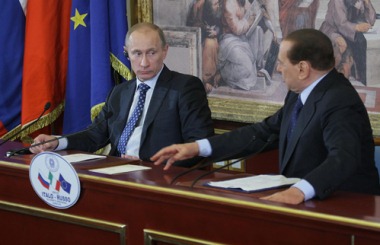The prospect of Enel's involvement in the Kaliningrad nuclear project has been raised by a cooperation deal with a Russian firm.
Kaliningrad is a Russian exclave on the Baltic sea positioned between Poland and Lithuania which Russia's state nuclear industry hopes to use to exports nuclear energy from the two VVER-1200 pressurized water reactors of the forthcoming Baltic nuclear power plant.
For the first time on Russian soil Rosatom is looking for foreign partners to take up to 49% of a nuclear project, and Italian power giant Enel now looks a likely fit. A cooperation agreement was signed by Enel chief Fulvio Conti and Boris Kovalchuk of Inter RAO UES during a meeting of the Italian and Russian prime ministers at Villa Gernetto, the private home of Silvio Berlusconi.
 |
| Prime ministers Vladimir Putin and Silvio Berlusconi meet the press after spending time at Berlusconi's villa |
Inter RAO UES represents a merger of a number of Russian power generators brought together in 2008 and is owned by state holding corporation Rosatom and nuclear operator Rosenergoatom. It will "provide terms and conditions for foreign investors' involvement in the Baltic nuclear power plant." It will also develop plans for the export and distribution of a "significant proportion" of power from the two 1170 MWe reactors. The Polish and Lithuanian markets would appear to be the main targets, ahead of their own plans to develop nuclear power capacity.
Separately, Enel will study the project and "evaluate the conditions and forms of its possible participation into the initiative." The plant is hoped to begin operation between 2016 and 2018.
Elsewhere in Italy
A fusion of interests |
While Enel plans with Electricité de France to construct a number of Areva EPR units, the prospect of reviving one of Italy's shut down reactors has surfaced in comments by Senator Guido Possa to financial newspaper IlSole24Ore. Possa said decommissioning the Caorso boiling water reactor, built by General Electric in the 1970s, would cost taxpayers about €500 million while it retains some €1 billion in value.
"I'm wondering why should we renounce such an economic benefit considering that the plant worked for only six years while in the world similar plants operative life has been extended to 60," said Possa. "The operation is technically feasible and it is convenient... as decommissioning activity [to date] has not included the structure and the main equipment."
Researched and written by World Nuclear News
with additional reporting by Luciano Lavecchia






_15863.jpg)







